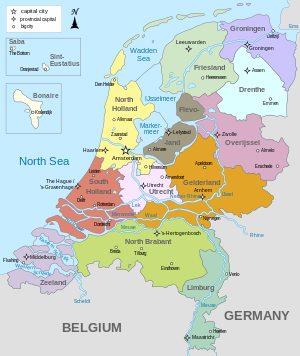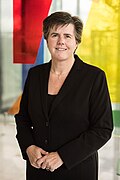King's commissioner

A King's commissioner (Dutch: Commissaris van de Koning, CvdK) is the head of government and legislature in a province of the Netherlands. When the reigning monarch is a woman, the title is Queen's commissioner (Commissaris van de Koningin).
A commissioner is appointed by the Dutch Crown as its official representative, and serves as the non-voting chair of the provincial legislature, the States-Provincial. He or she also serves as chair and full and voting member of the Provincial executive.
Background
[edit]The government of the Netherlands consist of the national institutions, the twelve provinces and the 342 municipalities. The three tiers are largely organised in the same way, with a directly elected legislature, which in turn elects the executive branch, that is headed by an chairperson appointed by the Dutch monarch and the Dutch crown respectively.
The provinces form the regional administration, between the national and municipal levels. They are responsible for issues such as spatial planning and health care, within the bounds prescribed by the national government. The provinces also oversee policy and finances of municipalities and other lesser authorities such as water boards.
The provincial legislature, called the States-Provincial or Provincial Council, are elected by direct popular vote every four years. The executive authority is exercised collectively by the College of the King's Commissioner and the Provincial executive. The latter is elected by, and are accountable to, the provincial council.
Appointment
[edit]The King's Commissioner is appointed by the Dutch Crown, meaning the Council of Ministers of the Kingdom of the Netherlands, for a for a term of six years, renewable. An appointed commissioner can only be dismissed by the Crown.
When a vacancy arises, the States Provincial express their preferences to the Minister of the Interior and Kingdom Relations, who, in turn, presents a candidate for appointment by the Council of Ministers.
The candidates are almost exclusively drawn from among prominent members of the major national political parties, but are expected to be politically impartial while exercising their office.
Responsibilities
[edit]- Head of provincial government, and highest representative of the province
- official representative of the central government to the province
- non-voting, impartial chair of the States-Provincial
- oversight of the provincial administration and provincial utilities
- chair and full, voting member of the Provincial council, with the possibility of holding their own political portfolio; common responsibilities include safety and public order
- coordinator of public disaster management and prevention
- part of the province's oversight of municipal policy and finances, by paying regular official visits to the municipalities of the provinces
- upon a vacancy as mayor (burgmeester) in a municipality of the province, reception of the municipal council's expressed preferences of candidate, and, based on that expression, recommending a candidate to the Minister of the Interior and Kingdom Relations
Naming practice in Limburg
[edit]In the Dutch province of Limburg, the King's Commissioner is informally referred to as Governor (Dutch: Gouverneur), drawing on the corresponding office in the bordering Belgian province of Limburg. Accordingly, the Province Hall (Provinciehuis) at Maastricht is thus often referred to as the Governor's Residence (Gouvernement).
This local custom arose from the particular status of the province in the nineteenth century. The official name of the office, however, is the King's Commissioner just as in the other Dutch provinces.
List of current King's commissioners
[edit]| Part of the Politics series |
![Azure, billetty Or a lion with a coronet Or armed and langued Gules holding in his dexter paw a sword Argent hilted Or and in the sinister paw seven arrows Argent pointed and bound together Or. [The seven arrows stand for the seven provinces of the Union of Utrecht.] The shield is crowned with the (Dutch) royal crown and supported by two lions Or armed and langued gules. They stand on a scroll Azure with the text (Or) "Je Maintiendrai" (French for "I will maintain".)](http://upload.wikimedia.org/wikipedia/commons/thumb/8/8f/State_coat_of_arms_of_the_Netherlands.svg/150px-State_coat_of_arms_of_the_Netherlands.svg.png) |
|---|
|
|
Source:[1]
See also
[edit]References
[edit]- ^ "Overzicht commissarissen van de Koning per februari 2022". rijksoverheid.nl (in Dutch). February 2022. Retrieved 17 March 2022.












